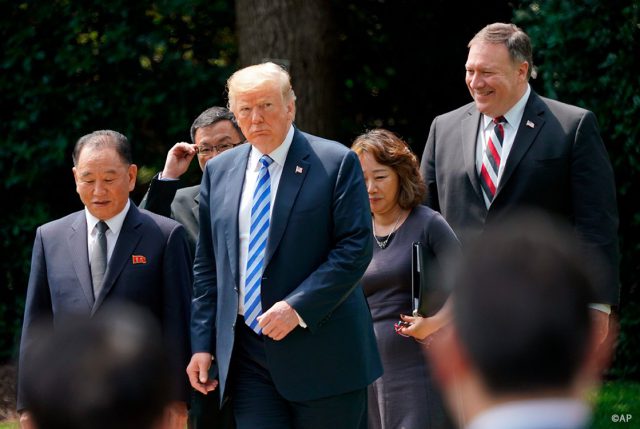
Twelve months ago, it would have been inconceivable to contemplate Donald Trump gearing up to meet, face to face, with his political nemesis, North Korean leader Kim Jong‑un. And yet, here we are today doing exactly that. Barring any last-minute mishaps, the two leaders, known to each other in less friendly times as ‘Little Rocket Man’ and ‘the Dotard’, will meet at a hotel on Singapore’s Sentosa Island on 12 June.
I have long held the view that diplomacy is the only way forward in solving the Korean crisis. And so, it would seem reasonable to argue that the Trump–Kim summit, following on from the recent series of inter-Korean summits and igniting a flurry of high-level regional diplomatic engagements, should be welcomed as a positive and long-overdue step towards resolving the Korean crisis.
But I’m not convinced. The on-again, off-again summit is short on substance, and as many have already noted, its objectives are ambiguous. Meanwhile the political circling of Kim Jong‑un, in particular by Russia’s foreign minister, Sergey Lavrov, and Syria’s embattled president, Bashar al‑Assad, smacks of cartoonish opportunism. The stakes for the region are high.
To be sure, a successful summit could shift the political and diplomatic trajectory of the Northeast Asian region, bringing peace to the Korean peninsula, normalising diplomatic relations and possibly even leading to the dismantling of North Korea’s nuclear arsenal. Failure, by contrast, could be catastrophic. It’s just not clear where the outcomes of this summit will land.
What is certain—amid intensifying media interest—is that the high-level diplomatic encounter will deliver a global spectacle with Trump and Kim sharing centre stage. It may even lead to a
Nobel Peace Prize for one or both of them. For these leaders, such optics are of intense importance, but they’re insufficient for delivering longer-term diplomatic outcomes.
Summitry, a key feature of modern diplomacy, draws on the optics of leaders interacting on the global stage. But there’s more to it. Summits that bring political leaders face to face in personal exchange and dialogue have been shown to de‑escalate and even transform conflict situations. They can act as a circuit breaker. The historic meetings between Ronald Reagan and Mikhail Gorbachev, which brought the Cold War to an end, provide a case in point. But some commentators have already pointed out, ‘
Donald Trump is no Reagan and Kim is no Mikhail Gorbachev’.
Of course Trump and Kim bring their own leadership traits to the process, which may prove advantageous in the summit scenario. Both have shown themselves to be disruptive leaders,
willing to push back against, and even eliminate,
the establishment. Both engage
outside the boundaries of tradition. Both crave the spotlight and seek recognition for achieving what their predecessors were unable to achieve.
It’s possible that the disruptive tendencies of their leadership styles, coupled with the desire for external recognition, will provide the necessary motivation for them to broker some kind of groundbreaking deal. Trump in particular, whose
disdain for the diplomatic profession is apparent, is likely to harbour such aspirations. His diplomatic overtures to date reveal an erratic style—one that leverages public venues, including social media for maximum impact and attention, while destabilising political counterparts and disrupting diplomatic tradition. Kim’s diplomatic style on the public stage is yet to be tested.
But there are deeper issues at play that will require substantial diplomatic effort and investment beyond the summit venue if lasting outcomes are to be achieved.
This is particularly evident in this case given that the US–North Korean relationship is marked by enduring strategic mistrust exacerbated by fiery rhetoric and hard power posturing between the two sides for decades. Kim’s outlandish provocations and Trump’s raging tweets that carried through much of last year simply ratcheted up the longstanding narrative of distrust and hostility.
Despite more recent gestures of goodwill shown by both leaders, it’s inevitable that they’ll enter the room with what Nicholas Wheeler refers to as a
‘bad faith model’ of each other. Building the kind of trust necessary for dialogue will be an exceptionally difficult task.
More worryingly, the narrative of distrust isn’t confined to these leaders, but is embedded within the psyche of both nations over generations. This is particularly so in North Korea, where deliberate policies of isolation, structural brutality and cradle-to-grave propaganda have cultivated a deep suspicion of outsiders, especially from the West. Both leaders face their own challenges in bringing their domestic audiences along on the diplomatic journey. But engaging North Korea through the process demands a far greater investment in diplomacy than this summit can provide—not just between the leaders, but also between officials and at the people-to-people level.
Herein lies the challenge for those diplomats supporting the summit, and
those looking on from afar: to consider how diplomacy, and not just ‘the deal’, might be leveraged over the long term to engage North Korea more meaningfully, and to shift its deeply embedded perceptions of ‘the other’. It’s not, by any stretch of the imagination, the main game, nor should it be right now. But it’s a factor that’ll make a difference to outcomes well beyond the spectacle of next week’s summit.
 Print This Post
Print This Post